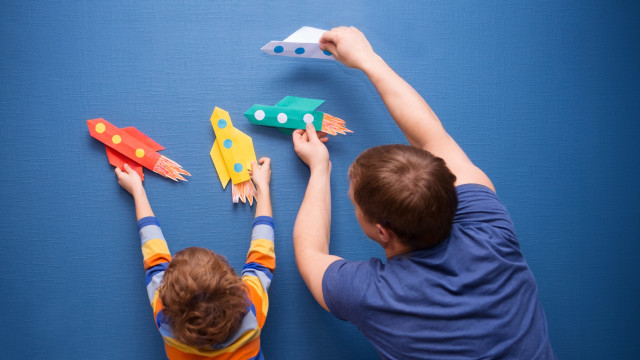How To Raise Mindful Kids

Being a parent is thought to be one of the toughest (and most rewarding) jobs on the planet. In a 2021 survey from the American Psychological Association, nearly half of modern parents (48%) surveyed said their level of stress had increased over recent years. Everyone wants to be a good parent, and no two parents are alike, so finding a one-size-fits all approach to healthy parenting can be challenging.
Naturally, demands outside the home can add chaos to already overwhelmed households. Balancing work schedules, relationships, children’s needs, planning for the future, and getting food on the table can seem impossible to manage, and it can feel challenging to be a consistently happy parent.
Enter the practice of mindfulness. Mindfulness skills are well-suited to “help people engage with uncomfortable, frustrating, and traumatic encounters by staying present in the moment and experiencing them as they are without judgment,” says Dr. David Vago, a research neuroscientist at Roundglass. Mindful parenting helps create space to open up a parent’s eyes to their thoughts and actions during challenging moments.
So how are parents meant to navigate raising emotionally healthy kids? And is it possible to raise happy kids that are thoughtful, kind, and conscious? Here, we learn from a handful of parenting experts, and offer parenting tips and tricks for raising an evolved being.
What Does It Mean to Parent More Mindfully?
The art and practice of mindfulness focuses on moment-to-moment awareness. When we are present with every moment, we minimize outside stresses and can step back and see broader perspectives — ultimately inviting in calm.
At its core, mindfulness allows for space to simply be, minimizing feeling overwhelmed and being less overly reactive. It has been scientifically shown to reduce stress and provide awareness of our emotions when we are mindful. When we do the deep, introspective practice of mindful awareness, it increases our attention to others’ wellbeing, providing the space to reflect and suspend judgment. This allows us to approach each new experience with warmth and kindness for ourselves and others.
“Being a dad has been a lesson in imperfection — for me, mindfulness has meant knowing how to stay stable amid the chaos. That helps me stay in touch with the most important thing of all in being a parent: my love, my son,” says Vishvapani Blomfield, a Roundglass meditation and mindfulness teacher.
Try this: Be more present in the moment with this guided meditation with meditation teacher Lisa Kring.
Mindful Parenting Basics
Unlike helicopter parenting, a term popularized in 1990 to describe an intensive form of parenting identified by overparenting and smothering children, mindful parenting is a more balanced approach. This style of parenting encourages children to express themselves openly, communicate with parents, and as a result feel safe and supported.
Practicing basic principles of mindfulness through meditation, and other exercises, has proven to be effective at reducing stress. For parents, a collection of studies and trials continue to support this thinking. Mindfulness-Based Stress Reduction (MBSR) was introduced in the 70s by Dr. Jon Kabat-Zinn, then a professor at the University of Massachusetts Medical Center, as a practice for stress reduction. “Mindfulness interventions for parents may reduce parenting stress and improve youth psychological functioning,” notes the School of Psychology at the University of Sydney.
Raising children gets easier when parents work to evolve themselves — learning essential mindfulness techniques like present-mindedness can help to neutralize reactions during the inevitable outbursts children have as they learn to navigate their own emotions. Mindful parenting speaks to how attentive, non-judging, and non-reacting parents are during interactions with children, and it is a process that is always evolving, as mindful parents learn and grow alongside children. “Mindful parenting is at the intersection of mindfulness, compassion, and skillful communication,” says Hunter Clarke-Field, author of “Raising Good Humans.”
Pro Tip: In times of stress, try this mindful parenting meditation with expert Lisa Kring to become less reactive.
Across all developmental stages for children, the more mindful a parent is, the less children internalize and externalize problems, as noted in a 2016 study from the International Society for Research in Child and Adolescent Psychopathology.
Mindful parenting is a step in a new direction, offering caregivers an opportunity to use science-based methods for navigating parental guilt, minimizing moments of negative reaction, and introducing children to a more healthful way of being. “Understanding how the stress response hijacks the brain, we can see that down-regulating our own nervous system is parenting priority number one,” says Clarke-Field. In essence, emotionally healthy parents tend to raise emotionally healthy kids.
How do You Raise Mindful Children?
Parents aren’t the only ones feeling pressure — stress in children is on the rise as well. ADHD, anxiety, behavioral problems ,and depression are the most commonly diagnosed mental disorders in children, according to the most recent data and statistics report on children’s health from the Centers for Disease Control and Prevention.
Children tend to be mindful naturally. They don’t have a collection of stored memory and fully conditioned minds that push and pull them into past and future. “Children have an innate sense of curiosity and a sense of wonder and awe that ground them in the present moment,” says Dr. Rebecca Acabchuk, a research scientist at Roundglass and mother of three. Adults, on the other hand, tend to struggle with busy minds, and are constantly receiving and reacting to stimuli from work, schedules, and outside sources.
From a very young age, mindfulness techniques can be taught and applied. During a child’s formative years, in terms of neuroplasticity and habit formation, it’s an opportunity to prime their brain and lay a healthful foundation with mindfulness. While the three stages of development are early childhood, middle childhood, and adolescence, you can model mindfulness at an age when they’re actually paying attention to you. “The younger children are, the more they think they’re a part of you,” says Acabchuk, and the more they are willing to follow your lead.
Teaching children from a young age how to pause and take a deep breath, realign their emotions to the present moment, and even eat mindfully, helps to build a healthy foundation that children can draw upon as they grow. Schools around the world have noted the benefit of practice, and several programs have introduced mindfulness into curriculums. From preschool to high school, learning mindfulness in schools has resulted in positive psychological impacts on social and physical wellbeing.
At home, mindful moments, especially when experienced consistently and over time, build connection between a parent and child, giving children the attention they crave, while giving them a safe environment to experience big emotions.
Pro Tip: Through this short meditation, work to let go of all personal judgments and agendas, and look at your children with compassion and understanding, accepting them fully just as they are.
A Mindfulness Toolkit for Parents
Use Your Breath
Taking a deep breath may feel ineffective, but taking a moment to pause, ground yourself in the present moment, and make a mindful choice to be aware versus react can spare parents from stress and anxiety around child meltdowns. “Resting awareness on the breath has been shown to directly activate the parasympathetic nervous system (aka the relaxation response) providing a direct experience of calm,” says Vago.
Children, too, can benefit from breathing practices, especially those they can engage with. Introduce young kids to 7-11 breathing — breathe in, counting to 7, and out, counting to 11 — repeating this for three breath cycles. Over time, as parents continue establishing this routine, children may adopt that habit, breathing on their own when they start to feel overwhelmed or anxious.
Introduce Meditation to Kids
Meditation and mindfulness work together — mindfulness can be practiced in meditations and spending time in meditation encourages mindfulness. And while we often take time out of the day to sit in meditation, mindfulness is a practice that can be done in every moment.
Much like mindfulness practices benefit adults, children reap similar rewards when they practice mindfulness meditation. Mindfulness-based cognitive therapy for children (MBCT — a practice combining cognitive therapy with meditation and mindfulness) has been shown to help improve attention and behavior problems, and reduce anxiety.
But try to get a child to sit quiet and still for 10 –minutes, and you’ll likely drive yourself mad. Instead, parents are encouraged to make time to sit with their children and expect lots of wiggles. Bedtime is a naturally quiet time and a good opportunity for consistent meditation, and children may settle more quickly when you introduce a favorite toy, blanket, or stuffed animal. Set a timer so children have something to work toward. “There is no need for you to feel as if you have to control your child’s behavior during this time. Instead, focus on your mindfulness meditation. Model the practice and enjoy the shared time together,” says Clarke-Fields.
Pro Tip: Try a counting meditation with your child, engaging them in the process and making it fun. This 4-2-6 breath meditation is useful for both children and adults.
Mindfulness is cultivated over time, through consistent practice, just like any other healthy habit. It is a science-based tool that can catalyze positive outcomes, and quite possibly one of the greatest gifts a parent could give themselves and their children. Here’s to more mindful kids and a less reactive world!
Key Takeaways:
- The art and practice of mindfulness focuses on moment-to-moment awareness.
- Being present in the moment can help minimize outside stresses.
- Mindful parenting encourages open expression, and communication in children.
- Introduce mindfulness techniques to children at a young age.









